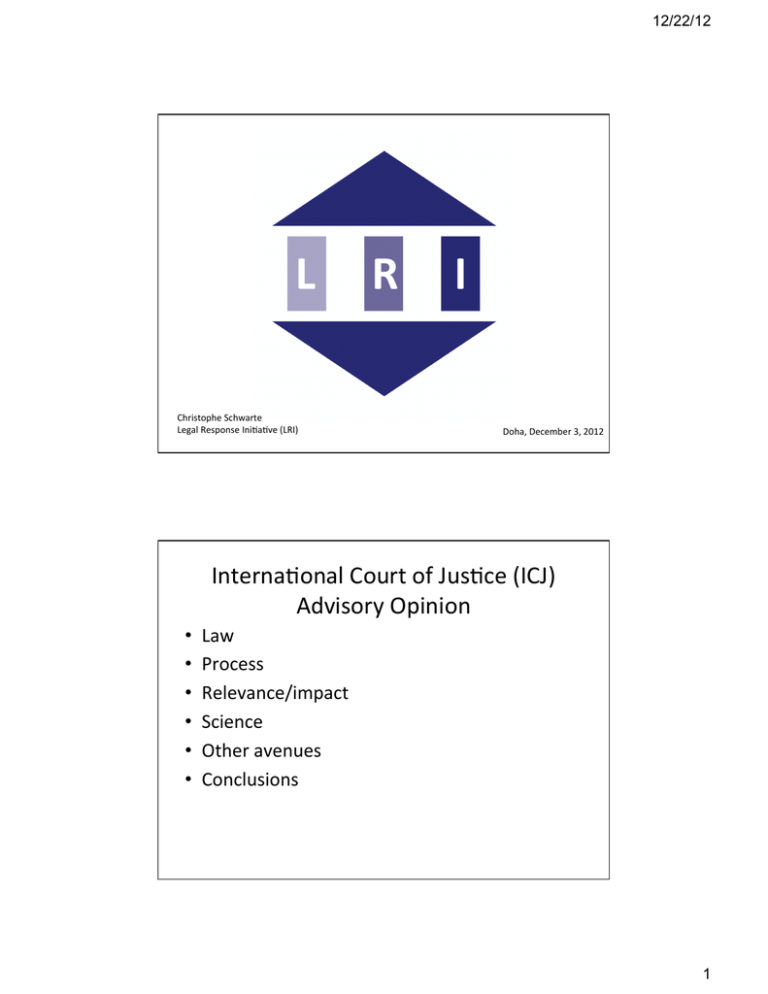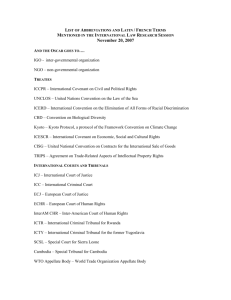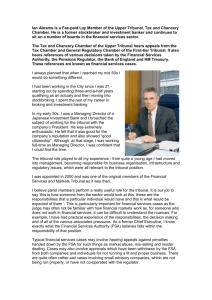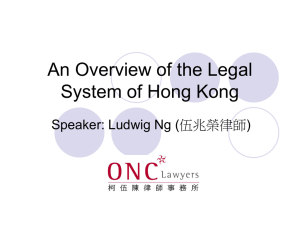Document 11499469
advertisement

12/22/12 Christophe Schwarte Legal Response Ini5a5ve (LRI) Doha, December 3, 2012 Interna5onal Court of Jus5ce (ICJ) Advisory Opinion • • • • • • Law Process Relevance/impact Science Other avenues Conclusions 1 12/22/12 Principle of preven5on (no harm) “The existence of the general obliga5on of states to ensure that ac5vi5es within their jurisdic5on and control respect the environment of other states or of areas beyond na5onal control is now part of the corpus of interna5onal law rela5ng to the environment.” (ICJ, Legality of the Threat or Use of Nuclear Weapons, 1996) Legal issues • Serious, significant, substan5al etc. harm • Legal consequence: Obliga5on to regulate and control with due diligence • Trans-­‐boundary and/or atmospheric pollu5on of different gases • Jus5fica5on, waiver or consent • Balance with right to exploit natural resources, development and other interests • Effect of climate nego5a5ons 2 12/22/12 Ques5ons Do states have a legal responsibility to ensure that any ac5vi5es on their territory that emit greenhouse gases do not harm other states? (Palau in GA) • What are the obliga5ons and responsibili5es under interna5onal law of a state for ensuring that ac5vi5es under its jurisdic5on or control that emit greenhouse gases do not cause, or substan5ally contribute to, damage to another state or states? Or: • Do Annex I countries have an obliga5on under interna5onal law to compensate developing country Par5es for damages from climate change? • Can states X and Y be held responsible for damages as a result of sea level rise in...? • Do states have a duty to undertake a transboundary risk assessment...? • Does the European Community have to apply the precau5onary principle in determining their emission reduc5on and limita5on targets? • Process • Majority in the UN General Assembly • Ques5on: + areas beyond na5onal jurisdic5on? • Poli5cal v. Legal • Submissions by UN members and intergovernmental organisa5ons • Ci5zens’ submissions 3 12/22/12 Impact of previous advisory opinions • Accordance with interna5onal law of the unilateral declara5on of independence in respect of Kosovo (2008/2010) • Legal Consequences of the Construc5on of a Wall in the Occupied Pales5nian Territory (2003/2004) • Legality of the threat or use of nuclear weapons (1994/1996) • Western Sahara (1974/1975) Nuclear Weapons Advisory Opinion • Unilateral declara5ons by nuclear powers • Treaty on the Non-­‐Prolifera5on of Nuclear Weapons renewed indefinitely • 5-­‐year review process • Poli5cal debate outside court room • Development of interna5onal humanitarian law • Domes5c law and jurisprudence 4 12/22/12 Science/causa5on • In Africa between 75 and 250 million people will be exposed to increased water stress by 2020 (IPCC) • In 2008 over 20 million people were displaced by sudden-­‐onset climate-­‐ related disasters (UN Office for the Coordina5on of Humanitarian Affairs) • Per year climate change already causes 300,000 deaths throughout the world and seriously impacts on the lives of 325 million people (Global Humanitarian Forum) • USD 70 to 100 billion per year by 2030 to deal with the worst impacts of climate change (UNFCCC) or true annual cost could reach USD 300 billion (others) • A record draught in northern Mexico has prompted warnings that the region’s climate may have changed for good (Independent Newspaper) • Global climate change has definitely contributed to the recent unprecedented flooding taking place in Thai south (Thailand's deputy chief nego5ator to the UNFCCC) Global temperature change (relaHve to pre-­‐industrial) 1°C 2°C 3°C 4°C 0°C Food Water 5°C Falling crop yields in many areas, par1cularly developing regions Falling yields in many Possible rising yields in some developed regions high la1tude regions Small mountain glaciers disappear – water supplies threatened in several areas Significant decreases in water availability in many areas, including Mediterranean and Southern Africa Sea level rise threatens major ci1es Ecosystems Extensive Damage to Coral Reefs Rising number of species face ex1nc1on Extreme Weather Events Rising intensity of storms, forest fires, droughts, flooding and heat waves Risk of Abrupt and Major Irreversible Changes Increasing risk of dangerous feedbacks and abrupt, large-­‐scale shi@s in the climate system 5 12/22/12 The 2010 Russian heat wave: ~50,000 deaths, $15bn cost to Russian economy Science • “…the intense 2010 Russian heat wave was mainly due to natural internal atmospheric variability.” – Dole et al, Geophysical Research LeMers, 2011 • “we es5mate … an approximate 80% probability that the 2010 July heat record would not have occurred without climate warming.” – Rahmstorf & Coumou, Proc. Nat. Acad. Sci., 2011 6 12/22/12 The role of large-­‐scale warming in the 2010 Russian heat wave: 1960s versus 2000s Chance of exceeding ngland and Wales 100 Not “impossible without warming” 200 150 100 50 0 Spring 2001 Nonïindustrial 1 29 1% 250 Autum 2000 Nonïindustrial me (years) 10% 10 100 Return time (years) Monthly temperature equivalent in °C 300 1% Daily peak flow in m3/s % eding ven year threshold in a given year Russia c) July temperatures, Western b) Spring flow, River Don, UK 10% 1% 27 “Mainly externally driven” 25 “Mainly internally generated” 23 21 19 17 2000ï2009 1960ï1969 15 13 1 10 100 Return time (years) Origins of the 2010 Russian heat wave • The warming that occurred since 1960 increased the probability of a heat wave of this magnitude from one-­‐percent-­‐per-­‐year to three-­‐percent-­‐per-­‐year. • So, two-­‐thirds of current risk is auributable to the large-­‐scale warming… and most of the large-­‐scale warming is auributable to anthropogenic greenhouse gas emissions. 7 12/22/12 Alterna5ve legal avenues • • • • • Nego5a5ons Mechanism for loss and damage Interna5onal dispute seulement Human rights Domes5c li5ga5on UNCLOS Seabed Disputes Chamber of the Interna5onal Tribunal for the Law of the Sea (ITLOS) shall give advisory opinions at the request of the Assembly or the Council on legal ques5ons arising within the scope of their ac5vi5es. (Art.191 UNCLOS) 8 12/22/12 Statute of Tribunal Ar5cle 20 -­‐ Access to the Tribunal 1. The Tribunal shall be open to States Par5es. 2. The Tribunal shall be open to en55es other than States Par5es in any case expressly provided for in Part XI or in any case submiued pursuant to any other agreement conferring jurisdic5on on the Tribunal which is accepted by all the par5es to that case. Ar5cle 21 -­‐ Jurisdic5on The jurisdic5on of the Tribunal comprises all disputes and all applica5ons submiued to it in accordance with this Conven5on and all mauers specifically provided for in any other agreement which confers jurisdic5on on the Tribunal. Rules of the Tribunal Ar5cle 138 1. The Tribunal may give an advisory opinion on a legal ques5on if an interna5onal agreement related to the purposes of the Conven5on specifically provides for the submission to the Tribunal of a request for such an opinion. 2. A request for an advisory opinion shall be transmiued to the Tribunal by whatever body is authorized by or in accordance with the agreement to make the request to the Tribunal. 9 12/22/12 Conclusions • • • • • • No silver bullet Create public awareness & poli5cal pressure Support and hinder the nego5a5ons Poten5al damage limited Legal guidance and principles? Important legal building block Sugges5ons • Civil society organisa5ons to lobby their governments • States to support ini5a5ve in GA • Science community to strengthen link between emissions and damage • Collaborate to prepare submissions to ICJ 10






